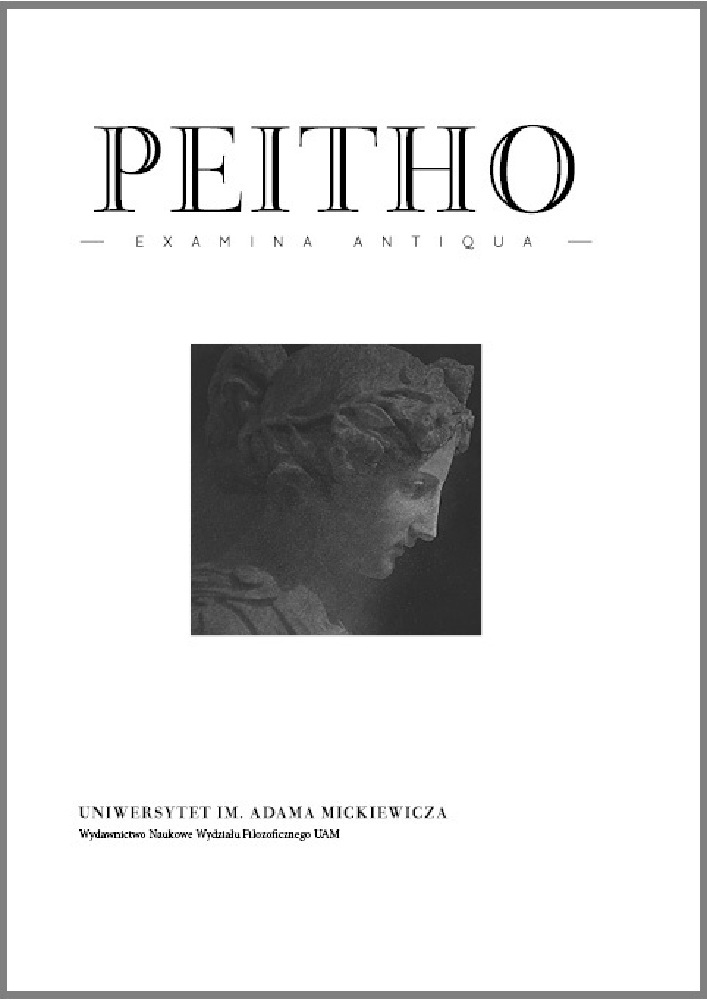Abstract
It is a recurring pattern in Plato´s dialogues that the dialectician leads the discussion to a certain point where he identifies further, more fundamental problems, on which he claims to have his own view (to emoi dokoun, vel sim.), which he does not communicate. Such passages are briefly analyzed from five dialogues (Timaeus, Sophist, Politicus, Parmenides, Republic). It is shown that this seemingly strange behaviour of the dialectician corresponds exactly to the way a philosopher should behave according to the Phaedrus. The recurring cases of reticence of the leading figure in dialogue have to be understood as Plato´s written reference to his own unwritten philosophy.
References
Kühn, W., 1998, “Welche Kritik an wessen Schriften. Der Schluß von Platons Phaidros, nichtesoterisch interpretiert“, Zeitschrift für philosophische Forschung 52, pp. 23–39.
Szlezák, T. A., 2010, “O zwykłej niechęci wobec agrapha dogmata”, Peitho 1, pp. 57–70.
Szlezák, T.A., 1985, Platon und die Schriftlichkeit der Philosophie. Interpretationen zu den frühen und mittleren Dialogen, Berlin and New York.
Szlezák, T.A., 1988, “Gespräche unter Ungleichen. Zur Struktur und Zielsetzung der platonischen Dialoge“, Antike und Abendland 34, pp. 99–116.
Szlezák, T.A., 1990, “Gespräche unter Ungleichen. Zur Struktur und Zielsetzung der platonischen Dialoge“, in: G. Gabriel, C. Schildknecht (eds.), Literarische Formen der Philosophie, Stuttgart, pp. 40–61.
Szlezák, T.A., 1992, Platone e la scrittura della filosofia, Milano.
Szlezák, T.A., 1993, “Zur üblichen Abneigung gegen die agrapha dogmata”, Methexis 6, pp. 155–174 (Apendix 172–174).
Szlezák, T.A., 2004, Das Bild des Dialektikers in Platons späten Dialogen. Platon und die Schriftlichkeit der Philosophie, Teil II, Berlin and New York.
Szlezák, T.A., 2005, O nowej interpretacji platońskich dialogów, Kęty, pp. 3–30.
Szlezák, T.A., 2009, Platao e a escritura da filosofia, Sao Paulo.
Szlezák, T.A., 2011, A imagem do dialético nos diálogos tardios de Platao, Sao Paulo.
Szlezák, T.A., 2015 or 2016a, “On the Meaning of the Key Concepts in Plato´s Criticism of Writing. A Philological approach to Phaedrus 274 b–278 e”, in: Platonic Investigations. Plato Philosophical Society. Russian State University for the Humanities, in preparation.
Szlezák, T.A., 2015 or 2016b, “Hermeneutische Grundprobleme der Platondeutung“, in: Platonic Investigations. Plato Philosophical Society. Russian State University for the Humanities, in preparation.
Szlezák, T.A., 2015, “Are there deliberately left gaps in Plato´s dialogues?”, in: D. Nails, H. Tarrant (eds.), Second Sailing. Alternative Perspectives on Plato, Helsinki, pp 271–284.
Vlastos, G., 1963, “H.J. Krämer: Arete bei Platon und Aristoteles“, Gnomon 35, pp. 641–655.
License
Peitho provides immediate open access to its content on the principle that making research freely available to the public supports a greater global exchange of knowledge.
